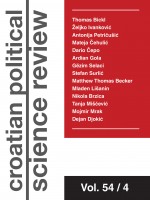The Political Economy of Crony Capitalism: A Case Study of the Collapse of the Largest Croatian Conglomerate
The Political Economy of Crony Capitalism: A Case Study of the Collapse of the Largest Croatian Conglomerate
Author(s): Željko IvankovićSubject(s): National Economy, Business Economy / Management, Economic history, Economic policy, Political economy
Published by: Fakultet političkih znanosti u Zagrebu
Keywords: Crony Capitalism; Rent Seeking; Mutual Hostage Model; Transition; Privatisation;
Summary/Abstract: Initially, cronyism was considered to be specific to Asian countries. Further analyses recognized characteristics of crony capitalism all over the world. According to the model presented in the paper, crony capitalism emerges in circumstances of political instability as a solution for the problem of economic growth. The model enables the analysis of cronyism in Croatia and an investigation into the question whether features of crony capitalism were a consequence of privatisation and the transition from socialism. The paper concludes that cronyism is primarily a political phenomenon and that crony capitalism cannot be reduced to its economic effects. Growth serves as a justification for the system of privileges. The collapse of Agrokor, the largest Croatian conglomerate, illustrates the development of crony capitalism in Croatia and its relation to the privatisation process.
Journal: Politička Misao
- Issue Year: LIV/2017
- Issue No: 04
- Page Range: 40-60
- Page Count: 21
- Language: English

